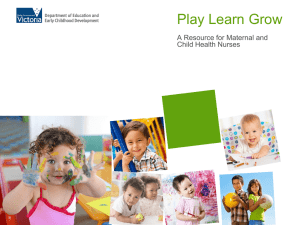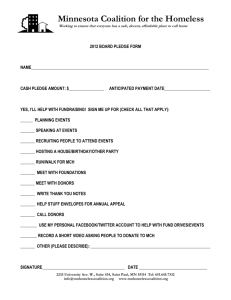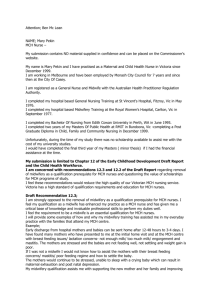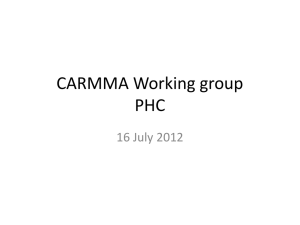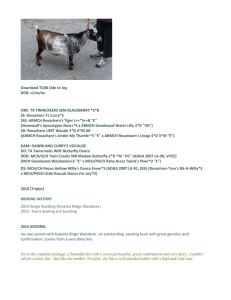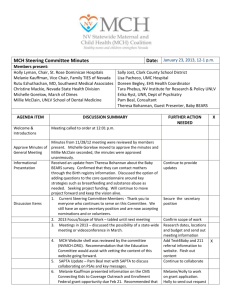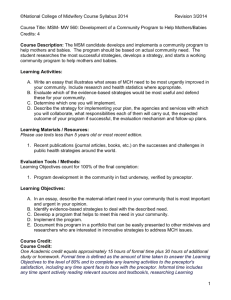Submission DR284 - Lee-Anne McLaren
advertisement
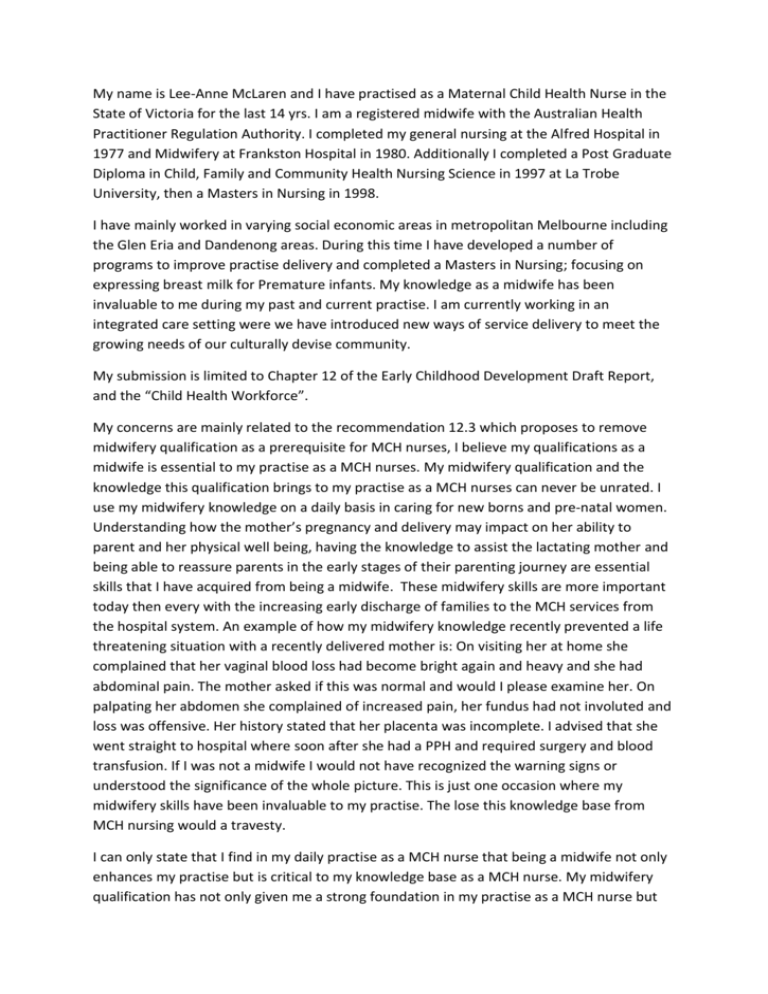
My name is Lee-Anne McLaren and I have practised as a Maternal Child Health Nurse in the State of Victoria for the last 14 yrs. I am a registered midwife with the Australian Health Practitioner Regulation Authority. I completed my general nursing at the Alfred Hospital in 1977 and Midwifery at Frankston Hospital in 1980. Additionally I completed a Post Graduate Diploma in Child, Family and Community Health Nursing Science in 1997 at La Trobe University, then a Masters in Nursing in 1998. I have mainly worked in varying social economic areas in metropolitan Melbourne including the Glen Eria and Dandenong areas. During this time I have developed a number of programs to improve practise delivery and completed a Masters in Nursing; focusing on expressing breast milk for Premature infants. My knowledge as a midwife has been invaluable to me during my past and current practise. I am currently working in an integrated care setting were we have introduced new ways of service delivery to meet the growing needs of our culturally devise community. My submission is limited to Chapter 12 of the Early Childhood Development Draft Report, and the “Child Health Workforce”. My concerns are mainly related to the recommendation 12.3 which proposes to remove midwifery qualification as a prerequisite for MCH nurses, I believe my qualifications as a midwife is essential to my practise as a MCH nurses. My midwifery qualification and the knowledge this qualification brings to my practise as a MCH nurses can never be unrated. I use my midwifery knowledge on a daily basis in caring for new borns and pre-natal women. Understanding how the mother’s pregnancy and delivery may impact on her ability to parent and her physical well being, having the knowledge to assist the lactating mother and being able to reassure parents in the early stages of their parenting journey are essential skills that I have acquired from being a midwife. These midwifery skills are more important today then every with the increasing early discharge of families to the MCH services from the hospital system. An example of how my midwifery knowledge recently prevented a life threatening situation with a recently delivered mother is: On visiting her at home she complained that her vaginal blood loss had become bright again and heavy and she had abdominal pain. The mother asked if this was normal and would I please examine her. On palpating her abdomen she complained of increased pain, her fundus had not involuted and loss was offensive. Her history stated that her placenta was incomplete. I advised that she went straight to hospital where soon after she had a PPH and required surgery and blood transfusion. If I was not a midwife I would not have recognized the warning signs or understood the significance of the whole picture. This is just one occasion where my midwifery skills have been invaluable to my practise. The lose this knowledge base from MCH nursing would a travesty. I can only state that I find in my daily practise as a MCH nurse that being a midwife not only enhances my practise but is critical to my knowledge base as a MCH nurse. My midwifery qualification has not only given me a strong foundation in my practise as a MCH nurse but has been used on many occasions to indentify small and significant problems with mothers and babies. I believe early detection of problems would on the whole go unrecognised without the knowledge obtained from completely midwifery. I have only given one example that enable me to indentify a potentially life threatening situation, it is not only being able to indentify life threatening situations but being a midwife is a benefit in my day to day practise as a MCH nurse. I my midwifery knowledge allows me to reassure families that their new babies behaviour is normal, this cannot be underestimated. I am also concerned that the draft has not highlighted the numerous strengths of the Victorian MCH Nurses Framework such as our practise is structured on evidenced based Key Ages and Stages Framework, there is a high reported level of satisfaction from the families using our services, that the Victorian framework allows for continuity of care of families from birth to 4 years of age and this is in practically important for our CALD families and refugees. Where building a trusting relationship with families and their communities is important for the families long term well being. Finally the Victorian framework which we practise under is strongly supported by DEECD. Furthermore I am concerned about what appears to be limited consultation by the Productivity Commission with Victorian Nurses. The Victorian MCH service is regarded as the best in Australia so I am surprised that the commission didn’t have Public Sittings with Victorian MCH nurses so the Commission could gain a better understanding of the many strengths of the Victorian MCH Framework. I would appreciate it if the Commission would meet with me and other MCH nurses to give you a more complete understanding of the strength of the current service offered to families in Victoria. In conclusion I hope that the evidence based and strong framework of the Victorian MCH nursing service can be adopted by other states and that the recommendation made by the commission are not imposed on Victorian nurses as I believe this will reduce and diminish the quality of the Victorian MCH nursing service. I thank the Commission for considering my comments.
